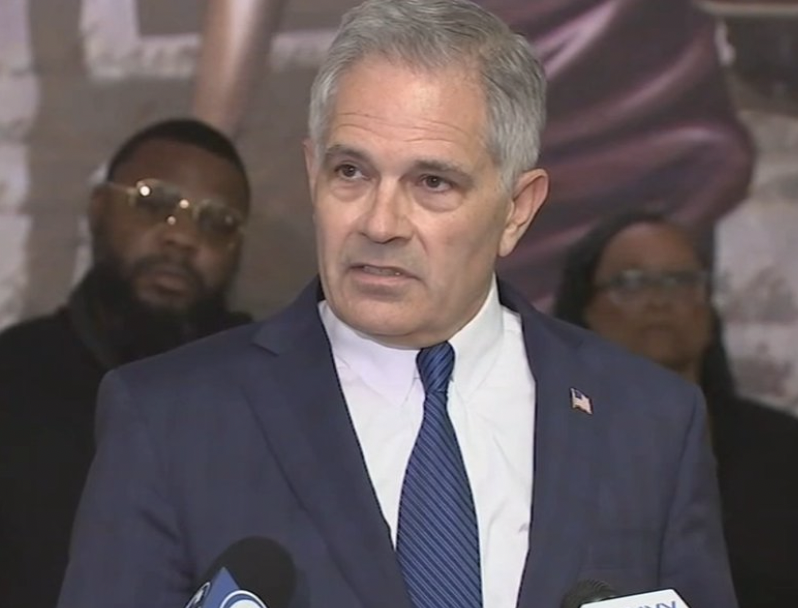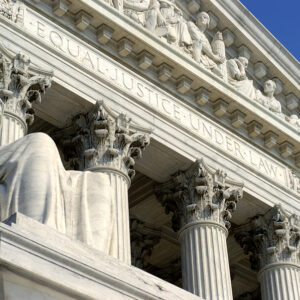Former Employee Appeals Ruling in Employment Discrimination Case Against Krasner

Even though the COVID-19 pandemic is over, a case stemming from it is pending in the Third Circuit Court of Appeals.
At issue is how far the government can go in restricting employees’ First Amendment exercise of their rights to practice their religion. Previously, a federal judge sided in favor of Philadelphia District Attorney Larry Krasner and the city in a religious discrimination case brought by Rachel Spivack.
In April 2022, Spivack, now an assistant district attorney in Luzerne County, was fired from her job as a Philadelphia assistant district attorney after she requested a religious exemption from getting the COVID vaccination. While Spivack asked for an exemption because of her Orthodox Jewish faith, others who were union members were not required to get vaccinated because their contract precluded the mandate, a court brief stated.
“Union membership does not guarantee COVID-19 immunity,” the brief noted.
“Religious liberty should not depend on union membership,” said Lea Patterson, senior counsel for First Liberty Institute, who argued the case. “The District Attorney disregarded the law by treating those like Rachel who requested religious accommodation less favorably than those who requested accommodation for other reasons. As the Supreme Court has already made clear, the government is not free to disregard the First Amendment’s protection of religious liberty in times of crisis.”
After waiting nearly seven months for a response to her request, it was denied, and she was fired. At the same time, 10 unionized employees and one medically exempt non-unionized employee were permitted to continue working without being vaccinated.
“Spivack’s request was denied when Krasner decided to summarily deny all religious exemption or accommodation requests,” the brief said. “Krasner terminated Spivack’s employment as a result, violating the Free Exercise Clause.”
“Krasner denied all religious exemption or accommodation requests because he believed he was not legally required to grant them,” the brief said.
Despite documentation from her rabbi, Krasner found her request to be “not credible,” the brief said.
“The (District Attorney’s Office) DAO Mandate is neither neutral nor generally applicable for four independent reasons: 1) Krasner possessed absolute discretion in granting exemptions to the Mandate; 2) the Mandate did not apply to unionized DAO employees; 3) Krasner granted a medical exemption to the Mandate; 4) Krasner’s decision to deny all religious exemption or accommodation requests derives from religious hostility. Any one of these is sufficient to trigger strict scrutiny.”
Krasner did not respond to a request for comment. However, in his response to Spivack’s appeal, his lawyers said Krasner changed his vaccine policy as medical advice changed and relied on legal counsel and the 1905 case Jacobson v. Massachusetts, which required smallpox vaccinations.
Krasner argued, “The Court should affirm the District Court’s decision granting summary judgment for District Attorney Krasner on Ms. Spivack’s First Amendment claim because there is no genuine issue of material fact that the DAO vaccine mandate is a neutral and generally applicable policy that satisfies rational basis review.”
And “it is also undisputed that the DAO experienced multiple, disruptive COVID-19 outbreaks throughout the pandemic..(describing COVID-19 outbreaks in the municipal court and trial units). In these circumstances, District Attorney Krasner reasonably concluded, based on recommendations of the CDC and the City Health Commissioner, that vaccination is the most effective and least restrictive measure available in light of the medical data and the DAO’s limited resources,” Krasner argued.
Spivack is seeking damages including back pay and attorneys fees in an amount that would be determined by the court, Patterson said.
First Liberty Institute is a non-profit public interest law firm and the largest legal organization in the nation dedicated exclusively to defending religious freedom for all Americans.
Please follow DVJournal on social media: Twitter@DVJournal or Facebook.com/DelawareValleyJournal



